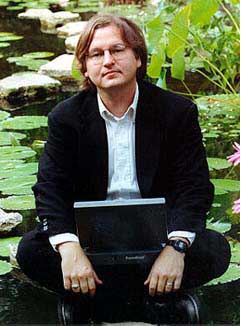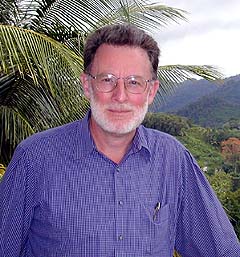|
 Supplement
Since late November 1999, nearly 1000 people from around the world have downloaded a free MP3 sample of Greenstar's music from the Middle East. Now we're throwing open the doors. You can download your choice of any of our 20 full-length MP3 music tracks. We've organized the music into themes: Romance-Acoustic, Mystic-Meditation, Celebration, and Chant-Wedding Songs. Here's the link:  Enthusiastic listeners from around the world responded to the complete music CD, nearly an hour of original, solar-powered recording called "Speaking Together," which you can order online at the Greenstar site:
This is a great way to start or expand your MP3 collection. The site also has links to free MP3 players for Windows or Macintosh, with full instructions: Each song is described in detail, with both English and Arabic titles. 50% of the proceeds of sale of the CD (now available for $11.95 worldwide, including shipping) go to the people of the village of Al-Kaabneh, where the music was recorded (using solar power) to improve their education, health and energy services. of January 3, 2000 bruces@well.com DISTRIBUTE AT WILL http://www.greenstar.org/Sterling/Sterling-Manifesto.pdf
In 1914, the lamps went out all over Europe. Life during the rest of the twentieth century was like crouching under a rock. But human life is not required to be like the twentieth century. That wasn't fate, it was merely a historical circumstance. In this new Belle Epoque, this delightful era, we are experiencing a prolonged break in the last century's even tenor of mayhem. The time has come to step out of those shadows into a different cultural reality. We need a sense of revived possibility, of genuine creative potential, of unfeigned joie de vivre. We have a new economy, but we have no new intelligentsia. We have massive flows of information and capital, but we have a grave scarcity of meaning. We know what we can buy, but we don't know what we want. The twentieth century featured any number of -isms. They were fatally based on the delusion that philosophy trumps engineering. It doesn't. In a world fully competent to command its material basis, ideology is inherently flimsy. "Technology" in its broad sense: the ability to transform resources, the speed at which new possibilities can be opened and exploited, the multiple and various forms of command-and-control -- technology, not ideology, is the twentieth century's lasting legacy. Technology broke the gridlock of the five-decade Cold War. It made a new era thinkable. And, finally, technology made a new era obvious. But too many twentieth-century technologies are very like twentieth-century ideologies: rigid, monolithic, poisonous and non-sustainable.
The immediate future won't be a period suitable for building monuments, establishing thousand-year regimes, creating new-model citizens, or asserting leaden certainties about anything whatsoever. The immediate future is about picking and choosing among previously unforeseen technical potentials. Our time calls for intelligent fads. Our time calls for a self-aware, highly temporary array of broad social experiments, whose effects are localized, non-lethal and reversible -- yet transparent, and visible to all parties who might be persuaded to look. The Internet is the natural test-bed for this fast-moving, fast-vanishing, start-up society. Because the native technology of the coming years is not the 19th century "machine" or the 20th century "product." It is the 21st century "gizmo." A gizmo is a device with so many features and so many promises that it can never be mastered within its own useful lifetime. A gizmo is flimsy, cheap, colorful, friendly, intriguing, easily disposable, and unlikely to harm the user. The gizmo's purpose is not to efficiently perform some function or effectively provide some service. A gizmo exists to snag the user's attention, and to engage the user in a vast unfolding nexus of interlinked experience. The gizmo in its manifold aspects is the beau ideal for contemporary design and engineering. Because that is what our culture will be like, at its heart, in its bones, in its organs. A gizmo culture. We will go in so many directions at once that most of them will never see fulfillment. And then they will be gone. This is confusing and seems lacking in moral seriousness -- but only only by the rigid standards of the past century, bitterly obsessed with ultimate efficiencies and malignant final solutions. We need opportunities now, not efficiencies. We need inspired improvisation, not solutions. Technology can no longer bind us in a vast tonnage of iron, barbed wire and brick. We will stop heaving balky machines uphill. Instead, we begin judging entire techno-complexes as they virtually unfold, judging them by standards that are, in some very basic sense, aesthetic. Henceforth, it is humans and human flesh that lasts out the years, not the mechanical infrastructure. Our bodies outlast our machines, and our bodies outlast our beliefs. People will outlive this "revolution" -- if spared an apocalypse, human individuals will outlive every "technology" that we are capable of deploying. Waves of techno-change will come faster and faster, and with less and less permanent consequence. Waves will be arriving with the somnolent regularity of Waikiki breakers. This "revolution" does not replace one social order with another. It replaces social order with an array of further possible transformations. Since gizmos are easily outmoded and inherently impermanent, their most graceful form is as disposable consumer technology. We should embrace those gizmos that are pleasing, abject, humble, and closest to the human body. We should spurn those that are remote, difficult, threatening, poisonous and brittle. Most of all, we must never, ever again feel awestruck wonder about any manufactured device. They don't last, and are not worthy of that form of respect.
Artists, don't be afraid of commercialization. The sovereign remedy for commercialization is not for artists to hide from commerce. That can't be done any more, and in any case, hiding never wins and strong artists don't live in fear. Instead, we have a new remedy available. The aggressive counter-action to commodity totalitarianism is to give things away. Not other people's property -- that would be, sad to say, "piracy" -- but the products of your own imagination, your own creative effort. This is the time to be thoughtful, be expressive, be generous. Be "taken advantage of." The channels exist now to give creativity away, at no cost, to millions. Never mind if you make large sums of money along the way. If you successfully seize attention, nothing is more likely. In a start-up society, huge sums can fall on innocent parties, almost by accident. That cannnot be helped, so don't worry about it any more. Henceforth, artistic integrity should be judged, not by one's classic bohemian seclusion from satanic mills and the grasping bourgeoisie, but by what one creates and gives away. That is the only scale of noncommercial integrity that makes any sense now. Freedom has to be won, and, more importantly, the consequences of freedom have to be lived. You do not win freedom of information by filching data from a corporate warehouse, or begging the authorities to kindly abandon their monopolies, copyrights and patents. You have to create that freedom by a deliberate act of will, think it up, assemble it, sacrifice for it, make it free to others who have a similar will to live that freedom. Ivory towers are no longer in order. We need ivory networks. Today, sitting quietly and thinking is the world's greatest generator of wealth and prosperity. Moguls spend their lives sitting in chairs, staring into screens, and occasionally clicking a mouse. Though we didn't expect it, we're all on the same net. We no longer need feudal shelters to protect us from the swords and torches of barbarian ignorance. So show them words and images: make it obvious, let them look. If they're interested, fine; if not, go pick another website. The structure of human intellectual achievement should be reformatted, so that any human being with a sincere interest can learn as much as possible, as rapidly as their abilities allow. The Internet is the greatest accomplishment of the twentieth century's scientific community, and the Internet has made a new intelligentsia possible. Like the scientific method, the Internet is a genuine, workable, verifiable means of intellectual liberation. Don't worry if it's not universal. Awareness can't be doled out like soup, or sold like soap. Intellectual vitality is an inherently internal, self-actualizing process. The net must make this possible for people, not by blasting flags and gospel at the masses, but by opening doors for individual minds, who will then pursue their own interests. This can be made to happen. It is quite near to us now; the trends favor it. The consequences of genuine intellectual freedom are literally and rightfully unimaginable. But the unimaginable is the right thing to do. The unimaginable is far better than perfection, because perfection can never be achieved, and it would kill us if it were. Whereas the "unimaginable" is, at its root, merely a healthy measure of our own limitations.  Human beings are imperfect and imperfectable, and their networks even more so. We should probably be happy for the noise and disruption in the channel, since so much of what we think we know, and love to teach, are mistakes and lies. But nevertheless, we can achieve progress here. We can remove some modicum of the fatal, choking constraints that throughout centuries have bent people double. A human mind in pursuit of self-actualization should be allowed to go as far and as fast as our means allow. There is nothing utopian about this program; because there no timeless justice or perfect stability to be found in this vision. This practice will not lead us toward any dream, any City on a Hill, any phony form of static bliss. On the contrary, it will lead us into closer and closer, into more and more immediate contact, with the issues that really bedevil us. Before many more decades pass, the human race will begin to obtain what it really wants. Then we will find ourselves confronted, in our bedrooms, streets, and breakfast tables, with real-world avatars of those Faustian visions of power and ability that have previously existed only in myth. Our aspirations will become consequences. That's when our *real* trouble starts. However, that is not a contemporary problem. The problems we face today are not those somber, long-term problems. On the contrary, we very clearly exist in a highly fortunate time with very minor problems. The so-called human condition won't survive the next hundred years. That fate is written on the forehead of the 21st century in letters of fire. That fate can be wisely shaped, or somewhat postponed, or brutally annihilated, but it cannot be denied. It is coming because we want it. It's not an alien imposition; it is borne from the inchoate depths of our own desires. But we're not beyond the limits of humanity, suffering that, exulting in that. We're just going there, visibly moving closer to it. Once we get there, we'll find no rest there. The appetite of divine discontent always grows by the feeding. This dire knowledge makes today's scene seem quite playful and delightful by faux-retrospect. Our worst problems, which may seem so large, diffuse, and morbid, are mere teenage angst compared to the conundrums we're busily preparing for some other generation. Sober assessment of the contemporary scene makes it crystal-clear that a carnival atmosphere is in order. We exist in a highly disposable civilization that is hell-bent on outmoding itself. The pace of change is melting former physical restraints into a maelstrom of reformattable virtualities. That's here, it's real, it is truly our situation. We should live as if we know this is true. This is where our own sincerity and authenticity are to be found: in the strong conviction that the contemporary is temporary. We need to live in these conditions in good faith. We need to re-imagine life and make the new implications clear. It's a murky situation, but we must not flinch from it; we must drench all of it in light. Because this is our home. We have no other. Our children live here. The mushroom clouds of the twentieth century have parted. We find ourselves on a beach, with wave after frothy wave of transformation. We have means, motive, and opportunity. Spread the light. Henceforth, it will make more and more sense to base our deepest convictions around a hands-on confrontation with the consequences of technology. That's where the action is. On January 3, 2000, that's what it's about. The deepest resources of human creativity have a vital role there. It's where inspiration is most needed, it's the place to make a difference. Come out. Stand up. Shine. Turn the lamps on all over the world. http://lonestar.texas.net/%7Edub/newfront.html About Viridian, from Wired Magazine: http://www.wired.com/news/news/culture/story/16777.html  http://www.amazon.com/exec/obidos/ASIN/0441003702/greenstsolarecom read all about it here.
 To unsubscribe from the Greenstar Newsletter at any time, send an email with "unsubscribe" as the subject to unsubscribe@greenstar.org Your comments and ideas are always welcome, addressed to editor@greenstar.org. An archive of all Greenstar newsletters to date may be seen at: |
 We need clean, supple,
healthy means of support for a crowded world. We need recyclable
technologies, industries that don't take themselves with that
Stalinesque seriousness that demands the brutal sacrifice of
millions. In order to make flimsy, supple technologies thinkable,
and then achievable, then finally obvious, we need an ideology
that embraces its own obsolescence.
We need clean, supple,
healthy means of support for a crowded world. We need recyclable
technologies, industries that don't take themselves with that
Stalinesque seriousness that demands the brutal sacrifice of
millions. In order to make flimsy, supple technologies thinkable,
and then achievable, then finally obvious, we need an ideology
that embraces its own obsolescence.

